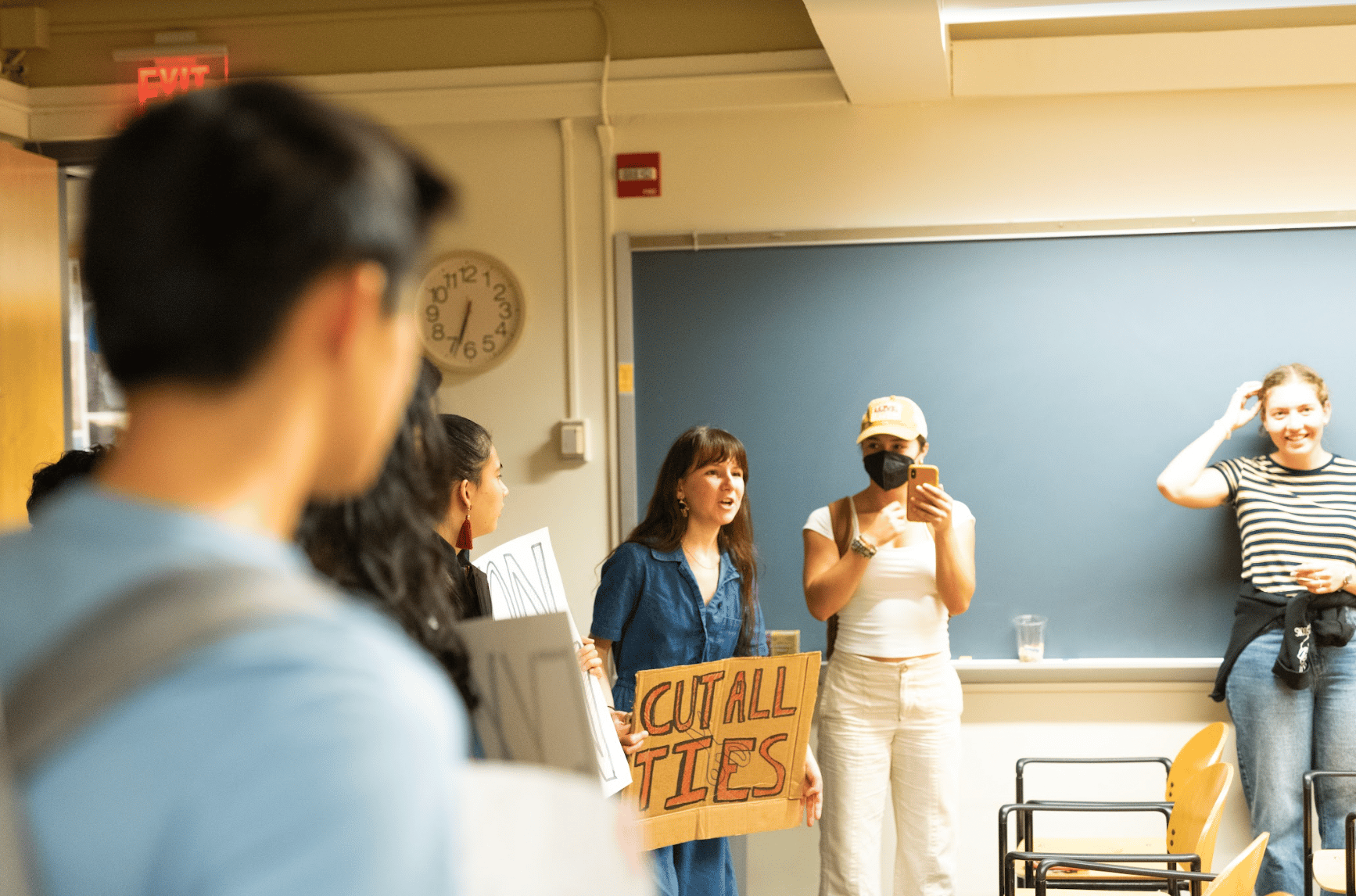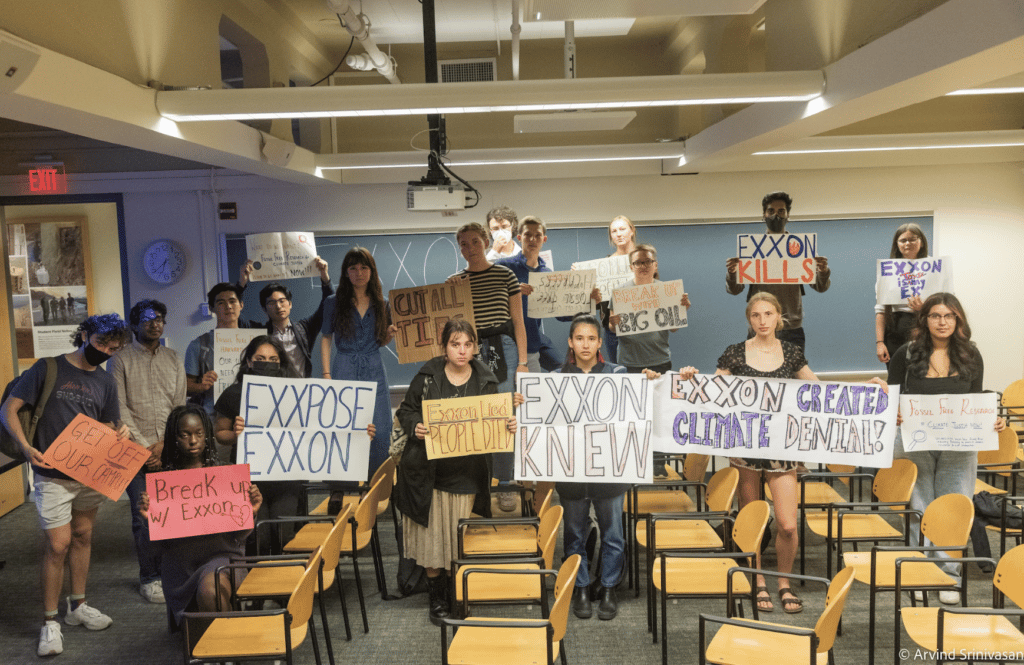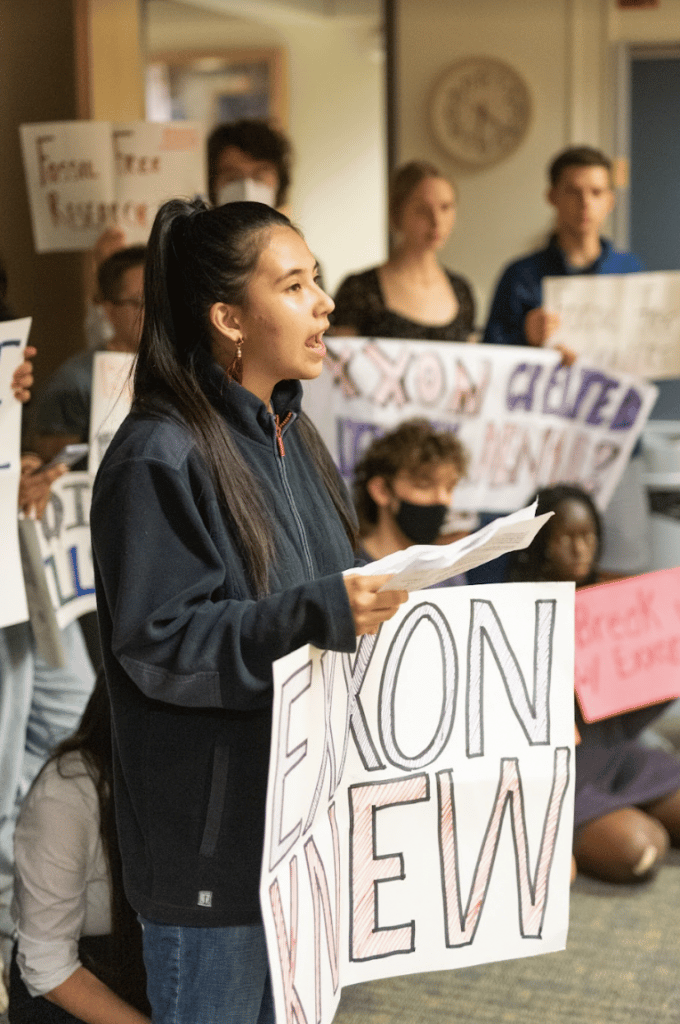Universities Must Work for Students, Not Big Oil

 Why you can trust us
Why you can trust us
Founded in 2005 as an Ohio-based environmental newspaper, EcoWatch is a digital platform dedicated to publishing quality, science-based content on environmental issues, causes, and solutions.
On Wednesday, October 12, around 30 students and community members of Harvard and MIT disrupted an ExxonMobil geoscience recruitment event hosted at MIT for both MIT and Harvard students. The disruption came a day after our allies at Brown University took similar action, disrupting another recruitment in this series by the company. Together, we’re rising up to make clear to our universities that opening our campuses to employers whose core business models are predicated on undermining all of our future but most especially, our futures as young people, is completely reprehensible. Our actions as at MIT and Brown are only the beginning: this is a clarion call for fossil free universities, now.

Already, student activists have made landslide progress on fossil fuel divestment. Last fall, we moved Harvard to divest its $53 billion endowment from the fossil fuel industry. In the mere two months after Harvard’s announcement, about a dozen other institutions from universities like the University of Minnesota to philanthropic foundations like the Ford Foundation and even pension funds like ABP pension fund made similar commitments. Now, we’re pushing these institutions to go further. A movement to expose and dismantle fossil fuel companies’ roles in climate research initiatives, Fossil Free Research, is surging internationally. From the University of Cambridge to Princeton, where student activism successfully compelled a commitment to dissociation from 90 oil and gas companies including its longstanding research partner ExxonMobil, students are making clear that fossil fuel majors shouldn’t be able to mooch off of universities’ prestigious name brands to greenwash their reputations or weaponize critical science and policy research to serve their bottom line of climate denial and delay.
And as our action shows, we’re fighting end Big Oil’s recruiting capabilities on campus, taking a page from our allies in the United Kingdom where the push for Fossil Free Careers has already made historic headway with the recent announcement that Birkbeck, University of London will be the first higher education to ban fossil fuel employers from its university careers service.
Companies driving climate breakdown and community devastation, from historic floods in Pakistan to Hurricane Ian’s destructive tear through Florida, aren’t good faith employers. Nowhere is that more obvious than in the case of ExxonMobil, a company notorious for lying about the reality of climate change for decades and even more egregious, launching concerted campaigns to silence critics – including Harvard’s own researchers – and skew the public’s understanding of the climate crisis.

And it’s not just that Exxon knew; it’s that Exxon knows that its business model turns on continued planetary and human harm, which is why the company continues to engage in climate subterfuge. Last year, in a leaked recording, Exxon lobbyist Keith McCoy directly invoked the company’s history of joining “shadow groups’ to work against some of the early efforts on climate'” as well as to its continued efforts to undermine climate policy under the Biden Administration. Moreover, a 2021 study by researchers Geoffrey Supran and Naomi Oreskes shows how ExxonMobil’s climate change messaging has mimicked tobacco industry propaganda to downplay the stakes of the climate crisis and deflect its outsize responsibility – as the fifth biggest producer of cumulative greenhouse gas emissions in recent history, according to CDP’s 2017 Carbon Majors Report – on individual consumers.
Welcoming Big Oil to recruit on campus is not only a massive ethical failure on the part of universities. It is also a fundamental failure to achieve the essential outcome of their careers services: to direct young people into jobs that can support our futures and our ability to contribute to larger society. In a decarbonizing world, there is no future in the fossil fuel industry for anyone. Fossil fuel jobs are already on the decline. Meanwhile, green jobs are proliferating. These are the jobs that universities should be directing students toward. Universities should host employers that will unite students in the fight against climate change and for a just renewable energy economy, not invite their complicit in pushing the world past the safe limit of 1.5 degrees Celsius of planetary warming.

Especially for as prestigious and well-resourced universities as Harvard, MIT, and Brown, there is no excuse for hosting an Exxon recruitment event. Indeed, these universities’ responsibility to lead the way in cutting ties to oil and gas giants is proportional to their outsized societal influence. And it’s also a core part of their credibility as climate actors; we can’t trust our universities to act in good faith on climate action pledges while they cozy up to fossil fuel majors.
Not just students but people everywhere see the writing on the walls. This spring, a consultant quit her work with Shell after 11 years: “I’ve come to the point where I can’t live with my own conscience for continuing to support a company that just so blatantly doesn’t care about what’s happening with the climate and the people that it will harm,” said Caroline Dennett. Meanwhile, public relations firms are coming under fire from employees for working with oil and gas giants, with 400 PR agencies already having pledged to decline future contracts with these companies.
As a senior at Harvard, I study the ethics of climate change. The irony of my university’s contribution to the climate crisis through its morally reprehensible ties to Big Oil, on gross display in recruitment events like that we disrupted, is not lost on me; indeed, it weighs on me every day. I want my university and all of higher education to step up to this crucial moment. Their way to do so is clear: cut ties to Big Oil. So for all of our peers, it’s time to leverage our power as future degree-holders and workers to ensure they do so.
Ilana Cohen is an organizer with Fossil Fuel Divest Harvard and Fossil Free Research.
Subscribe to get exclusive updates in our daily newsletter!
By signing up, you agree to the Terms of Use and Privacy Policy & to receive electronic communications from EcoWatch Media Group, which may include marketing promotions, advertisements and sponsored content.

 233k
233k  41k
41k  Subscribe
Subscribe 




